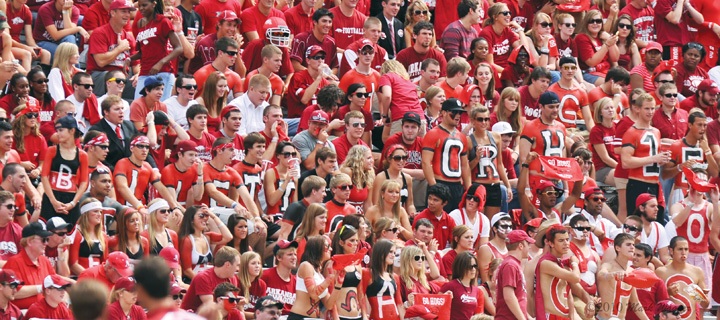Razorbacks Holding Firm on Not Charging Athletic Fee
by August 8, 2011 12:00 am 99 views

Since arriving at the University of Arkansas, athletic director Jeff Long has found additional funding through avenues like ticket increases, a new seat licensing plan and a multimillion-dollar media rights contract.
The Razorbacks seek what Long calls “new revenue streams” to fund operations, and every little bit helps in the ultra-competitive Southeastern Conference. But there is one stream Long and the department won’t be swimming up anytime soon.
Unlike the majority of their SEC peers, the Razorbacks do not charge a student athletic fee. That doesn’t figure to change anytime soon, although athletic departments across the country rake in six and seven figures annually by billing the student body per credit hour.
“I think it’s been a positive to not have the student fee in the past,” said Clayton Hamilton, Arkansas’ associate athletic director for finance.
Arkansas is in the enviable position of not needing those funds to keep its department running. While the Razorbacks could use an influx of extra cash, they’re among the exceptions in college athletics when it comes to charging student fees.
Many schools competing in the NCAA need those funds to help the department operate.
Some use the money to help balance the budget, while others charge the fee and still operate with a deficit.
Outside of the power conferences, the activity fees are widely used to fund operations. South Florida, for example, pulled in more than $13 million in activity fees during the 2009-10 fiscal year, according to BusinessofCollegeSports.com.
A recent USA Today report found that only 22 of 228 Division I athletic programs operate with a balanced budget or have revenues that exceed expenditures. Arkansas is among the schools at which athletics aren’t a drain on the bottom line for the university at large.
There also are a handful of schools where the student fee is charged, but has no real bearing on the athletic department’s financial status. Consider: The University of Florida, which reported $106 million in revenue for 2010-11, still charges its student body.
Kristi Dosh, an attorney, author and blogger with an emphasis on sports business, has explored in detail the fees charged by schools to the student body to help fund athletics. While some schools need the money, others seem to charge it simply because they have in the past.
“I’m surprised Arkansas doesn’t charge a student fee because they’re not at the top of the list in revenues in the SEC,” said Dosh, who runs BusinessofCollegeSports.com.
“That’s an area where they could make a few million. What’s puzzling is there are schools that charge it, but don’t need it.
“Why does Florida actually need that money?”
SEC schools that add the activity charge onto student bills are pulling in between $738,194 (Kentucky) and $5.2 million (Auburn). Nearly 10.5 percent of Mississippi State’s budget in 2009-10 came from per-credit hour charges to students.
Alabama, Arkansas and LSU are the only schools in the SEC that apparently received no money from student fees.
Vanderbilt’s status is unknown because it’s a private school.
With an enrollment of 20,000 students at Arkansas, establishing a fee would certainly provide a nice boost to the bottom line. Those eight schools in the league that have student athletic fees included in their budgets are bringing in an average of $2.5 million.
Implementing student fees to infuse additional revenue into the budget would be a good bump, but it doesn’t seem to be anything the Arkansas athletic administration has any interest in pursuing. At a time when many schools are taking money from the university and its students, the Razorbacks are actually giving $1 million annually to the school.
Arkansas essentially gets money only from students who are genuinely interested in supporting athletics. Ticket packages were recently put on sale to the student body and for $65 they get entry to football games at Reynolds Razorback and War Memorial stadiums, plus basketball games.
Financial support only from students who want to support the department seems to be the preferred course of action at Arkansas. It’s a longstanding tradition not to charge the fee and it is expected to continue.
“While that’s a revenue item going to a lot of our peer schools that’s not going to the University of Arkansas, we’re looking at other revenue streams,” Hamilton said.
“That’s not something we’re actively pursuing.”
Chris Bahn is the editor of ArkansasSports360.com. Bahn covers sports and the business of sports for Arkansas Business Publishing Group.
